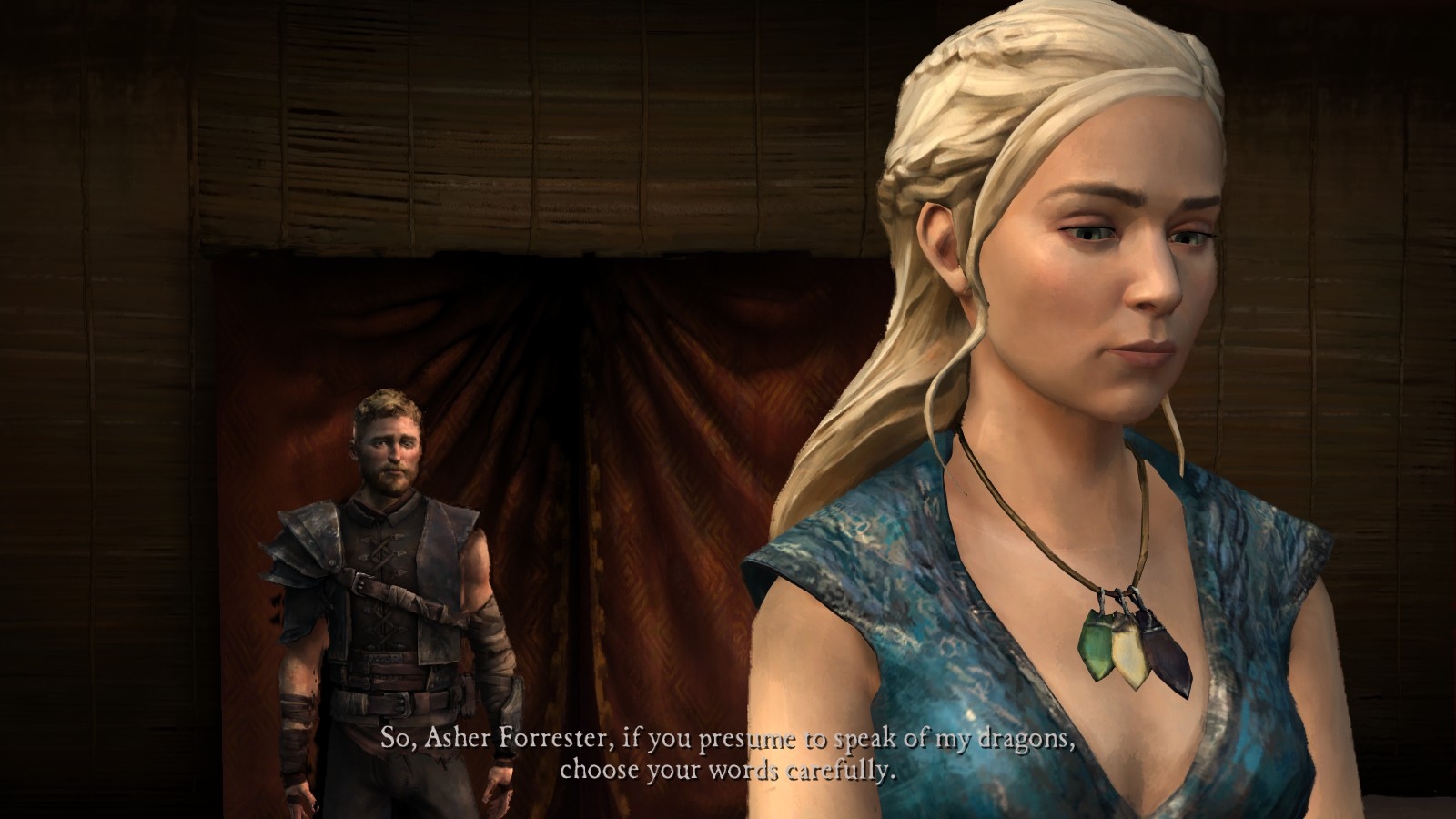

However, the Wall scenes are redeemed by a few good twists in the story. Here, as a result of Telltale's signature "helix" storytelling structure, in which story paths diverge only to be reunited a short time later, the previous episode's decisions were noticeably robbed of consequence – I felt I was too easily able to talk my way back into the good graces of whichever character I’d wronged.

At the Wall, Gared’s again pushed to pick sides between his two companions in the Night's Watch. Telltale’s done a good job establishing his relationship with Beskha, making it hard to forsake her even for the good of the family, represented by Asher's wooden uncle Malcolm. But in terms of prologues it’s more like the Star Wars prequels: lots of treading water to set up something probably way more interesting than they are.Across the Narrow Sea, Asher Forrester’s scenes force you to decide where your version of this character’s priorities lie. Since there is a forthcoming second season of the game, it’s pretty clear that this one is merely a prologue. What is the North Grove? Why are we supposed to care about it? No one knows. The only real exception is Gared’s storyline which goes somewhere but is never explained. All of the struggles and challenges you overcome are essentially for nothing. All of the characters either end up dead or right back where they started. Perhaps most importantly, the story simply goes nowhere. It’s not just that you could get as much enjoyment out of watching someone play instead of playing it yourself, I actually think you’d enjoy it more by watching instead of playing. This is true to some degree of all of their games (it’s sort of their thing, after all), but this one is an extreme example. Telltale’s game is a game that wants to be a television show. Particularly toward the end of the series I found myself wishing I could just watch someone else go through the motions, since I obviously wasn’t in any sort of control over anything. I just think that, in general, this is not something that makes you want to actually play the game. Feeling hopeless and out of control is a key feature of Game of Thrones. But Game of Thrones pushes you away.Īgain, in some sense this means that the game has captured the feeling of Game of Thrones. Telltale draws you in, puts you in the universe. So the sort of game that Telltale is known for is fundamentally opposed to the setting of Game of Thrones. But you’d never voluntarily trade places with any of them. You might like some of them or even partially identify with some characteristic of theirs. When you watch the show or read the books you don’t want to be the characters, you want to see what happens to them. Game of Thrones is brutal and cruel and unrelenting. Game of Thrones does not do this, and never has. In The Lord of the Rings or Star Wars you want to be the heroes, despite the dangers they face, because their lives are cool and exciting. Lots of fantasy universes on television and in books rely on audience identification to draw viewers and readers in and to make them want to actually be in the universe they’ve created. It just also means that the very premise of a game like this set in the Game of Thrones universe is maybe not as enticing as you might think. I do think that this means the game is a success: it accomplishes what you would expect such a game to accomplish. “It just also means that the very premise of a game like this set in the Game of Thrones universe is maybe not as enticing as you might think.”

But constant depression doesn’t exactly make for enjoyable gameplay. Maybe that’s a good thing, since the television series (and the books, of course) have also not done much to make Westeros and Essos look like inviting vacation destinations. It’s not particularly fun being in Game of Thrones, it turns out. And so about a third of the way through the series, when it starts to become clear that things are headed in a pretty solid direction whether you want them to or not, you start to rebel against the world you’ve been dropped into. By forcing you to click on various mundane objects and actually walk the characters around the screen and decide how they react in many many dialogue trees, you feel like you actually are the characters. Martin’s fantasy universe succeeded in capturing the endless futility that is so characteristic of the series and, through the intense identification that comes with controlling and making choices for the characters in the game, actually makes you as hopeless as everyone else.


 0 kommentar(er)
0 kommentar(er)
